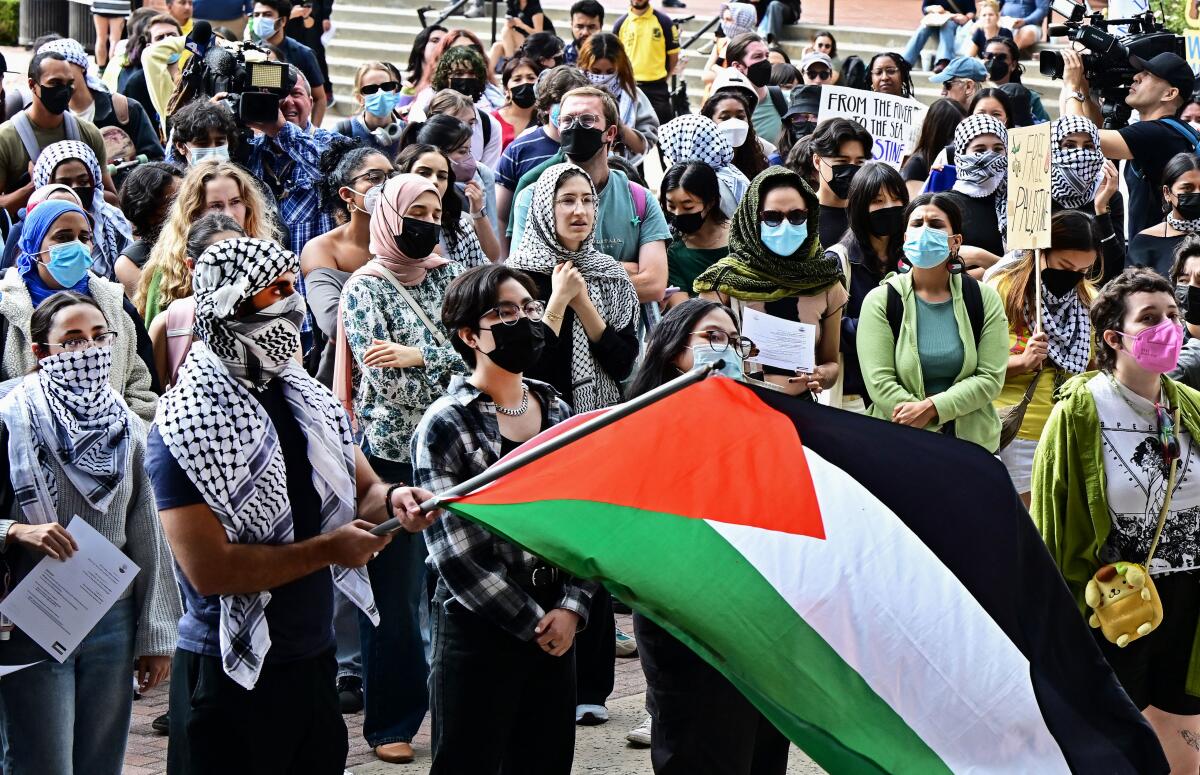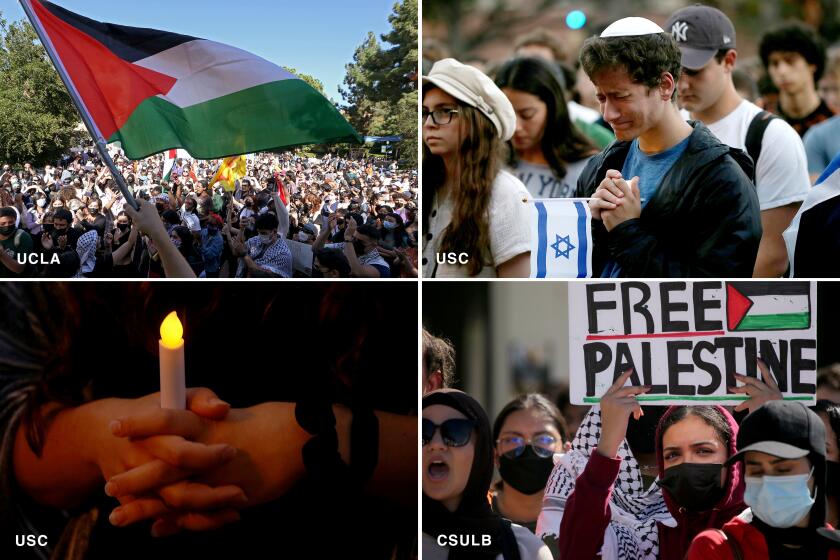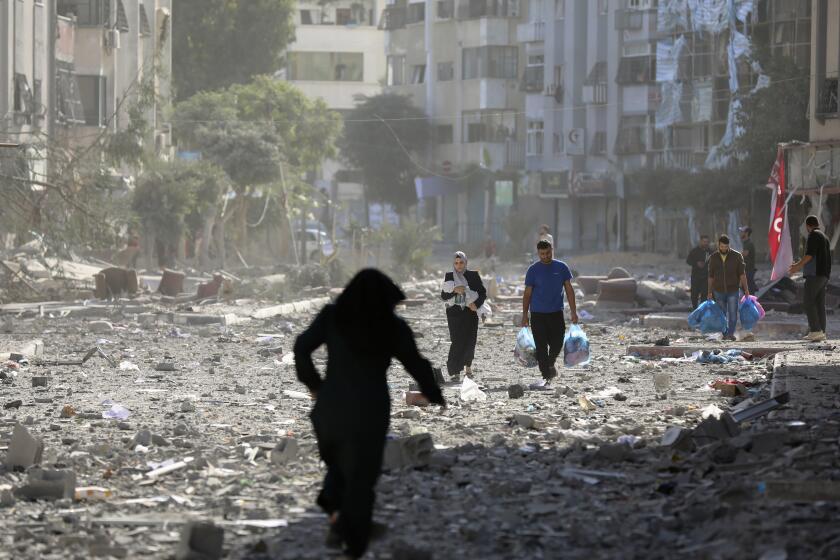UC faculty group stood with Palestinians. That ‘legitimized’ Hamas ‘terrorism,’ regent says

- Share via
A letter from a University of California faculty group condemning UC’s use of the word “terrorism” to describe this month’s Hamas attacks on Israel and urging the administration “to uplift the Palestinian freedom struggle” has drawn a furious counter from one university regent, who responded with a letter of his own Tuesday.
Jay Sures, vice chairman at United Talent Agency and a member of the UC Board of Regents, wrote that the letter sent Oct. 16 by the UC Ethnic Studies Faculty Council to the board, UC president and campus chancellors was full of “falsehoods, inaccuracies, and antisemitic innuendos” and “seeks to legitimize and defend the horrific savagery of the Hamas massacre of October 7.”
“Our statement of condemnation of the October 7th massacre of Israeli civilians by Hamas was absolutely justified and necessary because terrorism has no place in our world,” Sures wrote. “As human beings we need to condemn it immediately and forcefully without fear of retribution or that some may be offended.”
College campuses are supposed to be bastions of intellectual discourse and debate, but the war in Gaza underscores tense narratives and little if any interchange between students.
The Oct. 9 statement from Board of Regents Chair Richard Leib and UC President Michael Drake called the Hamas attack, which killed about 1,400 Israelis and led to more than 200 others taken hostage, “an act of terrorism” and the violence “sickening and incomprehensible.”
In response, the Ethnic Studies Faculty Council, which represents more than 300 faculty members across the UC system, called on the administration to “retract its charges of terrorism, to uplift the Palestinian freedom struggle and to stand against Israel’s war crimes against ethnic cleansing and genocide of the Palestinian people.”
Since the ambush by Hamas militants, Israel has launched a barrage of airstrikes on the Gaza Strip, sealed it off from vital resources such as fuel and begun a more recent ground incursion.
The Palestinian death toll has exceeded 8,500 people, including mostly women and children, according to Gaza’s Hamas-run Health Ministry. More than 1.4 million people in Gaza have been displaced, according to the United Nations’ Office for the Coordination of Humanitarian Affairs.
Against that backdrop, tensions on U.S. campuses have ratcheted up as sharply divided student bodies grapple with the conflict, holding protests, vigils and writing letters. The vitriolic climate at scores of universities — including UCLA and UC Berkeley — has chilled speech and torpedoed efforts to build understanding, students and faculty told The Times this month.
The ethnic studies council said in its letter that because of the UC administration’s “egregious failure of leadership,” students attending and organizing pro-Palestinian rallies have faced “racist harassment, physical threats and violence by Zionist students.”
The council’s letter said the administration’s stance lacked “context” around the Israeli-Palestinian conflict.
“A community trying to free themselves from decades-long ethnic cleansing and genocide is not the same as one of the world’s strongest state militaries, a nuclear power with the unconditional backing of the United States, wielding advanced forms of technologized destruction aimed at full-spectrum dominance,” the letter read. “To equate the two and to hold the oppressed accountable for ‘terrorism’ reinscribes a colonial narrative that seeks to have the world believe that history began on October 7, 2023.”
Andrew Jolivette, co-chair of the Ethnic Studies Faculty Council and chair of UC San Diego’s Department of Ethnic Studies, wrote in an email that Sures’ comments “speak volumes on their own about what he thinks of what is happening principally to Palestinian children, with consequential impact also on Israeli children and issues of multi-generational trauma.”
U.S. military advisors are taking ground-war lessons from Iraq to talks with Israel. Whether Israel will take the advice is unclear.
Sures urged the council to retract its statements and to condemn the Hamas attack unequivocally.
“In addition, your organization should commit to learning more about antisemitism and all forms of hate and how it lives on our campuses where you are tasked and trusted with educating our next generation of students and leaders,” he added.
Former Walt Disney Studios Chairman and DreamWorks SKG co-founder Jeffrey Katzenberg, who has known Sures, a Hollywood talent executive, for decades, said he admired Sures’ “quick and unequivocal response back to them.”
“This is Jay speaking truth to power,” Katzenberg said. “It’s a moment in time when people seem to be going into their respective silos and allowing misrepresentation and falsehoods to get traction out there in the world.”
After Sures’ letter was published, Leib said in a statement that he stood by the Oct. 9 comments that he and Drake made.
“My concern is also the dramatic rise in antisemitism, both in the country but especially on our campuses across the country,” he added.
White House officials have said the Department of Justice and Department of Homeland Security will be providing support to college campuses to address an “alarming” rise of antisemitic incidents since the Hamas attack.
Hate crimes against Muslims are also on the rise. A week after the Hamas attack, an Illinois man stabbed a 6-year-old Palestinian American boy to death and wounded his mother because they were Muslim, authorities said. The Justice Department is investigating the killing as a hate crime.
More to Read
Sign up for Essential California
The most important California stories and recommendations in your inbox every morning.
You may occasionally receive promotional content from the Los Angeles Times.













